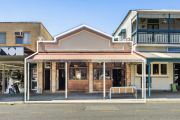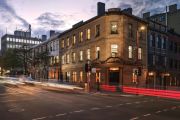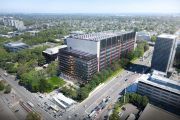
Co-working office space is staging a comeback as demand rises
Co-working and hybrid workspace operators are seeing signs of recovery as local and offshore operators grow their footprint and occupiers target higher flexible space usage.
Having been the darling of the office market before the pandemic, then hit hard when no one wanted to work near other people, the flexible office market footprint has increased by 2.1 per cent in the major east coast markets in the 12 months to June.
CBRE’s latest Australian Flex Space in the Age of Hybrid Work report shows there is a more positive outlook for the sector after a slower-than-expected post-pandemic return to the office and a degree of consolidation in the market.

The report reveals the penetration of flex operators in these markets represents 2.7 per cent of office stock, down from 3.1 per cent at the sector’s peak in early 2020.
In turn, CBRE’s 2023 occupier survey shows while about 70 per cent of the Australian-based respondents have either no exposure or less than 10 per cent exposure, to flex space this number is expected to reduce to just 41 per cent in three years. This indicates a further push into the sector by occupiers.
Major landlords including Dexus, Lendlease and GPT, among others all offer flexible space to tenants and are looking to expand the offerings as the demand increases over the next year.
CBRE’s Australian head of office research Tom Broderick said office landlords were looking at the evolving working dynamics by exploring solutions such as flexible office spaces and third spaces within their buildings.
“This shift is driven by the changing preferences of tenants and the recognition that providing adaptable and versatile work environments can enhance tenant satisfaction, attract new occupants, and ultimately add value to their properties,” Broderick said.
Hub Australia has been one of the more active in the area and is opening its flagship site at 44 Martin Place, Sydney with a high-end luxury offering.
Hub chief executive Brad Krauskopf said the group was working with Hassell Studio to create “an iconic Sydney workspace inside a beautiful heritage listed building, which is the enviable and ideal place to work for a range of high-end financial, technology, legal and blue-chip organisations in Sydney”.
In Melbourne, the Singapore co-working space provider JustCo is set to open a co-working centre in Emporium Melbourne in the first half of next year. The company says the incorporation of workspaces within retail complexes offers “the ideal fusion of work and life that resonates strongly with today’s workforce”.
The new offering will be located on the fourth floor of the building and will feature private office suites, meeting rooms with video conferencing capabilities, hot desk zones and purpose-built micro-spaces.
CBRE’s Asia-Pacific head of flexible real estate Sidharth Dhawan said evolving workplace dynamics had triggered the need for flexible space operators to rethink their offerings to remain relevant and appealing in a post-pandemic world.
“These offerings vary by tenure and customisation, ranging from gym pass-like day memberships on the one end, through to fully turnkey managed spaces on the other,” Dhawan said.
“International operators now see Australia as a mature flex market offering growth potential and some are actively looking at opportunities, particularly in prime grade buildings.”











